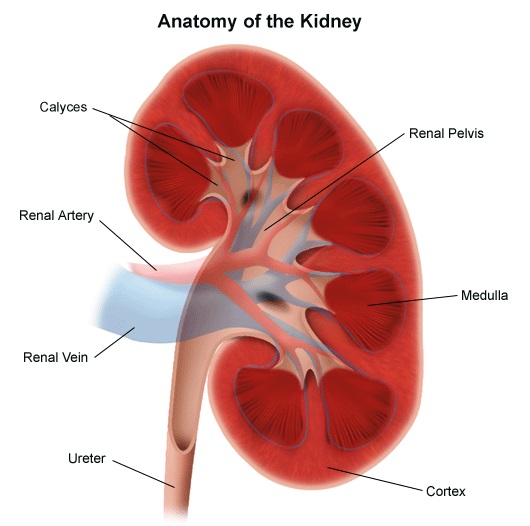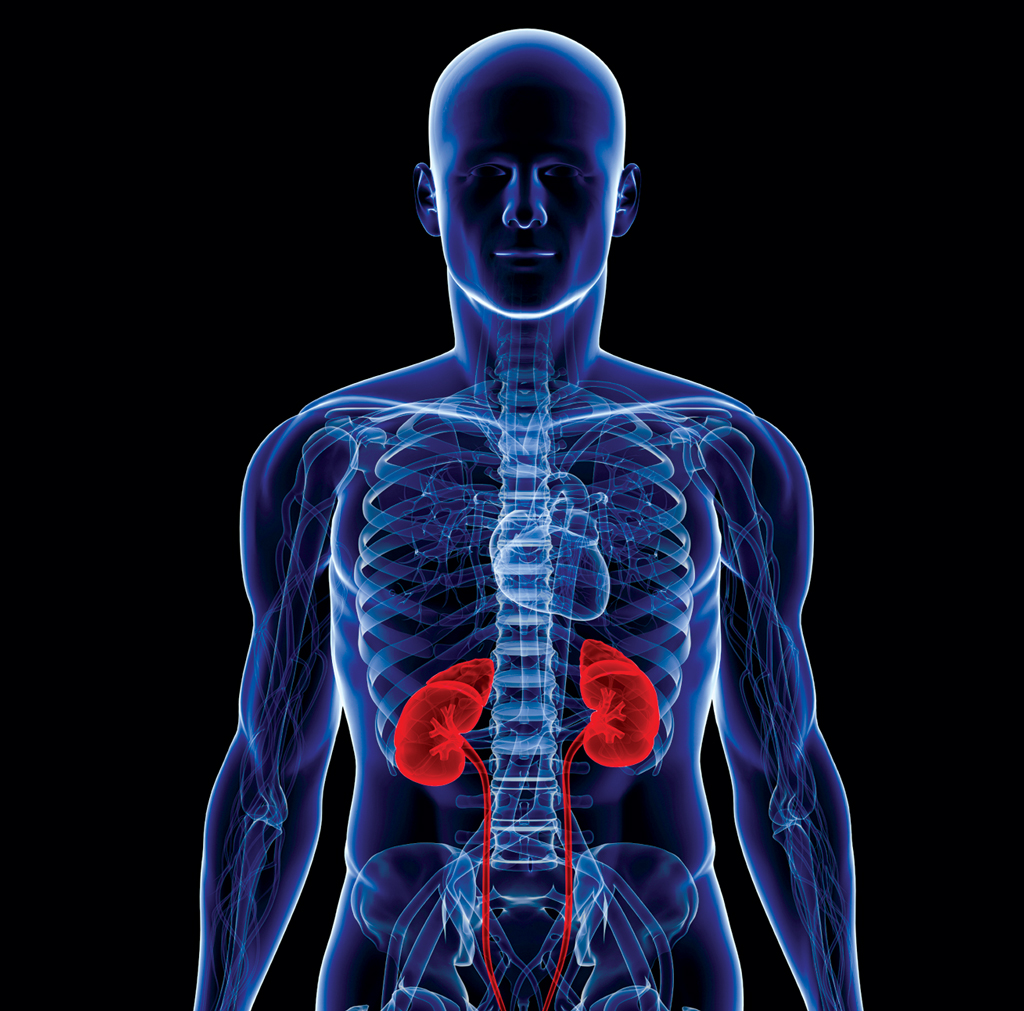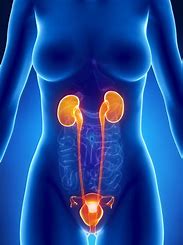Chronic Disease Education
Acute Condition Education
Working with your Family Physician
Working with Allied Care Providers
Renal Conditions

Information - Renal Conditions: Kidney Disease, Kidney Stones & Bladder Infection
 People have two kidneys, located above the waist on either side of the spine. There are a number of renal conditions that can affect people of all different ages. Kidney Disease In patients with kidney disease, fluid and waste products begin to build up in the body. This renal condition leads to weakness, swelling in the ankles, shortness of breath and other symptoms. If you have acute kidney disease, your kidneys suddenly stop working. Acute renal disease can occur when there isn’t enough blood flow to the kidneys, if urine backs up in the kidneys or if the kidneys are damaged. Causes of acute kidney problems include: • Enlarged prostate • Traumatic injury with blood loss • Pregnancy complications • Sepsis infection • Dehydration If you have chronic kidney disease, it means your kidneys don’t work well for longer than three months.
People have two kidneys, located above the waist on either side of the spine. There are a number of renal conditions that can affect people of all different ages. Kidney Disease In patients with kidney disease, fluid and waste products begin to build up in the body. This renal condition leads to weakness, swelling in the ankles, shortness of breath and other symptoms. If you have acute kidney disease, your kidneys suddenly stop working. Acute renal disease can occur when there isn’t enough blood flow to the kidneys, if urine backs up in the kidneys or if the kidneys are damaged. Causes of acute kidney problems include: • Enlarged prostate • Traumatic injury with blood loss • Pregnancy complications • Sepsis infection • Dehydration If you have chronic kidney disease, it means your kidneys don’t work well for longer than three months.
 Causes of chronic kidney disease include type 1 and type 2 diabetes, high blood pressure, kidney infection and autoimmune disorders. In the early stages of renal disease, you may experience no symptoms. If renal disease gets severe enough, you may experience kidney failure. If your kidneys fail, you will need dialysis or a kidney transplant. Kidney disease treatment depends on the type of kidney disease you have. First, your doctor will determine what caused your kidney disease. You may work with a physician and a nephrologist (a doctor who specializes in kidney disease).
Causes of chronic kidney disease include type 1 and type 2 diabetes, high blood pressure, kidney infection and autoimmune disorders. In the early stages of renal disease, you may experience no symptoms. If renal disease gets severe enough, you may experience kidney failure. If your kidneys fail, you will need dialysis or a kidney transplant. Kidney disease treatment depends on the type of kidney disease you have. First, your doctor will determine what caused your kidney disease. You may work with a physician and a nephrologist (a doctor who specializes in kidney disease).
 Kidney disease treatment involves controlling symptoms, reducing complications and slowing the progression of the disease. Because high blood pressure increases your likelihood of developing chronic renal disease, your doctor may prescribe ACE inhibitors or ARBs to control blood pressure. Kidney Stones Kidney stones (also called renal lithiasis or nephrolithiasis) are hard, crystalline minerals that form in the kidneys due to a decrease in the volume of urine or an increase of stone-forming substances in the urine. Risk factors for kidney stones include dehydration, gout, heredity, diet and certain medications. Symptoms of kidney stones include: • Severe pain, often accompanied by nausea, vomiting, fever and chills • Blood in your urine • Difficulty passing urine Most kidney stones eventually pass through the ureter, bladder and urethra on their own. The treatment of kidney stones includes: • Drinking more fluids • Drugs that relax the spasming ureter to help the passage of kidney stones • Shock waves to break the stone into smaller fragments (lithotripsy) • A surgical procedure called a ureteroscopy with laser lithotripsy Bladder Infection
Kidney disease treatment involves controlling symptoms, reducing complications and slowing the progression of the disease. Because high blood pressure increases your likelihood of developing chronic renal disease, your doctor may prescribe ACE inhibitors or ARBs to control blood pressure. Kidney Stones Kidney stones (also called renal lithiasis or nephrolithiasis) are hard, crystalline minerals that form in the kidneys due to a decrease in the volume of urine or an increase of stone-forming substances in the urine. Risk factors for kidney stones include dehydration, gout, heredity, diet and certain medications. Symptoms of kidney stones include: • Severe pain, often accompanied by nausea, vomiting, fever and chills • Blood in your urine • Difficulty passing urine Most kidney stones eventually pass through the ureter, bladder and urethra on their own. The treatment of kidney stones includes: • Drinking more fluids • Drugs that relax the spasming ureter to help the passage of kidney stones • Shock waves to break the stone into smaller fragments (lithotripsy) • A surgical procedure called a ureteroscopy with laser lithotripsy Bladder Infection
 Most bladder infections are acute and caused by a bacterial infection in the bladder. A bladder infection is a type of urinary tract infection (UTI). Bladder infections are caused by bacteria that enters through the urethra and moves into the bladder. Usually, your body removes these bacteria by flushing them out in your urine, unless they multiply too quickly, resulting in a bladder infection. Bladder infection symptoms include: • Burning or pain when urinating • Frequent urge to urinate • Cloudy, bloody or foul-smelling urine The sooner you seek bladder infection treatment the better. The infection can quickly spread, even leading to a kidney infection if left untreated. To diagnose a bladder infection, your primary healthcare provider may perform a urine culture and prescribe medication. You can ease bladder infection symptoms at home by drinking lots of water and cranberry juice and using a heating pad.
Most bladder infections are acute and caused by a bacterial infection in the bladder. A bladder infection is a type of urinary tract infection (UTI). Bladder infections are caused by bacteria that enters through the urethra and moves into the bladder. Usually, your body removes these bacteria by flushing them out in your urine, unless they multiply too quickly, resulting in a bladder infection. Bladder infection symptoms include: • Burning or pain when urinating • Frequent urge to urinate • Cloudy, bloody or foul-smelling urine The sooner you seek bladder infection treatment the better. The infection can quickly spread, even leading to a kidney infection if left untreated. To diagnose a bladder infection, your primary healthcare provider may perform a urine culture and prescribe medication. You can ease bladder infection symptoms at home by drinking lots of water and cranberry juice and using a heating pad.
Print this Action Plan and check off items that you want to discuss with your healthcare provider
-
Drink plenty of water and avoid getting dehydrated.
-
If you have symptoms of kidney disease, kidney stones or bladder infection, see your primary healthcare provider right away.
-
Maintain a healthy weight. Being overweight increases your risk of diabetes and high blood pressure, which increases your risk of kidney disease.
-
Eat a well-balanced diet rich in fruits and vegetables and low in salt, sugar and trans/saturated fats.
-
If you smoke, quit. Smoking can make kidney disease worse and may speed kidney damage.
-
High blood pressure is a leading cause of kidney disease, so work with your doctor to manage your blood pressure and cholesterol.
-
Avoid alcohol or drink in moderation. Your kidneys filter harmful substances from your blood, including alcohol. Drinking too much can affect your kidneys.
-
Know your family’s health history.
-
Consult with a fitness trainer or exercise specialist to create a customized exercise plan for you.
-
Urinate as soon as you feel the need and before/after sex. This can help prevent bladder infections.



